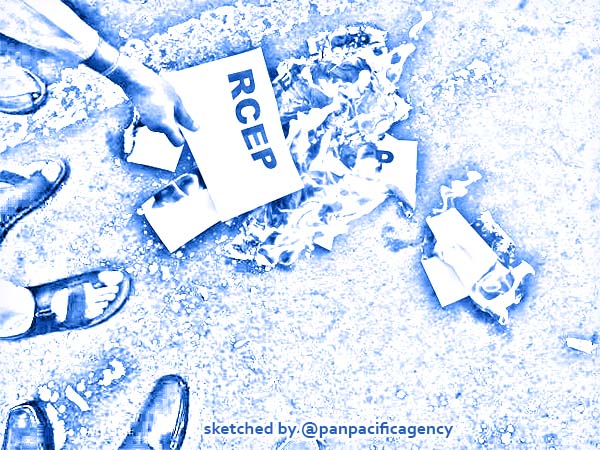[Analytics] India-Australia trade agreement doesn’t signal India’s return to RCEP

A protester burns placards during a demonstration against the Indian Government's plan to join the RCEP in New Delhi. Picture: Sajjad Hussain/AFP. Sketched by the Pan Pacific Agency.
The much-awaited Economic Cooperation and Trade Agreement (ECTA) between Australia and India was signed on 2 April 2022. The ECTA is an interim trade deal that should pave the way for a wider and deeper comprehensive economic cooperation agreement between the two countries. It was enabled by India’s ‘China-exclusive’ trade agreement approach and avoiding key areas of political disagreement between the two countries. Amitendu Palit specially for the East Asia Forum.
The ECTA was signed in record time. It took only six months from the commencement of negotiations in 2021 to conclude the deal. The signing marked formalisation of preferential trade rules between two countries with a long history of unfruitful negotiations.
By eliminating tariffs on more than 85 per cent of Australian exports to India and more than 90 per cent of Indian exports to Australia, the ECTA expects to considerably enlarge the current bilateral trade of US$24.3 billion. India is expected to become Australia’s third largest export market by 2035 as well as one of the foremost locations for Australian outbound investment.
Australia and India begun negotiating a free trade agreement in 2010. Negotiations were suspended in 2015 with neither country willing to concede market access on politically sensitive issues. India was unwilling to grant preferential access to Australian agricultural exports while Australia was reluctant to offer easier visas to Indian professionals. Given these seemingly irreconcilable differences, the remarkably quick conclusion of the ECTA is a largely unexpected outcome.
How did the ECTA get signed so fast? The agreement avoided some of the most politically contentious areas between the two countries while protecting key Indian interests and was consistent with India’s moves to secure trade agreements exclusive of China.
The ECTA is certainly not exhaustive. The ECTA focuses on tariff reductions, facilitating trade in services and enabling investments. Several major Australian exports — fruits, vegetables, seafood, meat, wine and energy — will get preferential access in the Indian market. For India, the biggest gains will be the easy visa access allowed to students and IT professionals. Trade in professional services should benefit from mutual recognition of professional qualifications between regulatory agencies. These are politically sensitive issues for both countries.
Circumstances have changed since both countries suspended talks in 2015. India became markedly defensive on free trade agreements. The biggest demonstration of its scepticism was its withdrawal from the Regional Comprehensive Economic Partnership (RCEP) in November 2019. But its perspective towards the agreements changed soon after the outbreak of COVID-19 in early 2020 and its far-reaching strategic repercussions. India begun discussing free trade agreements with several ‘like-minded’ partners, including Australia.
The ECTA is a result of the deepening strategic proximity between India and Australia following their worsening political ties with China and the urgency to strengthen cooperation among members of the Quad and countries in the Indo-Pacific. It follows another significant economic initiative involving both countries, the Supply Chain Resilience Initiative (SCRI) between Japan, Australia and India, to reduce sourcing dependencies on China.
Both countries have realised the necessity of working together for safeguarding mutual security and economic interests. This was reflected in the decision to upgrade relations to a comprehensive strategic partnership in June 2020. The signing of the ECTA less than two years later reflects their political commitment to nurturing a robust and prosperous relationship.
The ECTA is among several free trade agreements India is negotiating. A few weeks before the ECTA, India signed a Comprehensive Economic Partnership Agreement (CEPA) with the United Arab Emirates. It is currently negotiating agreements with the United Kingdom, Canada, the EU, Israel and the Gulf Cooperation Council.
But India’s recharged free trade strategy is unlikely to bring it back to RCEP. The line of thinking among Indian decision-makers for quitting RCEP remains forceful.
Indian domestic industry was not in favour of RCEP. Major Indian exporters — gems, jewellery, leather, refined petroleum products, garments — didn’t visualise more access in RCEP markets. This pessimism arose from India’s existing agreements with various RCEP members not producing sufficient opportunities for Indian exports. India’s relative lack of competitiveness across a range of manufacturing products in most RCEP markets makes RCEP a difficult sell. This generated fears over cheaper imports from RCEP countries displacing Indian producers from domestic markets, particularly with respect to Southeast Asia and China.
India’s reluctance to sharing a trade agreement with China also drove it to withdraw from RCEP. Since the Doklam border crisis in 2017, India’s relations with China have significantly deteriorated. The poor relations compounded the economic hesitations. Relations got worse following clashes at the disputed border in the Himalayas in June 2020 leading to several casualties on both sides. The situation has subsequently stabilised with both countries disengaging militarily. Nevertheless, Indian politicians will not contemplate the possibility of India entering a trade agreement that would allow Chinese products and investments preferential access to its domestic market.
These fears cause India to favour a bilateral member-specific approach to building relationships with RCEP members without joining RCEP. India has comprehensive economic cooperation agreements with ASEAN, Japan, Malaysia, Singapore, South Korea and Thailand. These agreements are currently being reviewed. After the ECTA with Australia, the only RCEP members with whom India doesn’t’ have trade agreements are New Zealand and China. The ECTA might spur bilateral trade talks with New Zealand. This would be consistent with India’s ‘China-exclusive’ trade agreement policy.
Amitendu Palit is Senior Research Fellow and Research Lead (Trade and Economics) at the Institute of South Asian Studies, National University of Singapore.